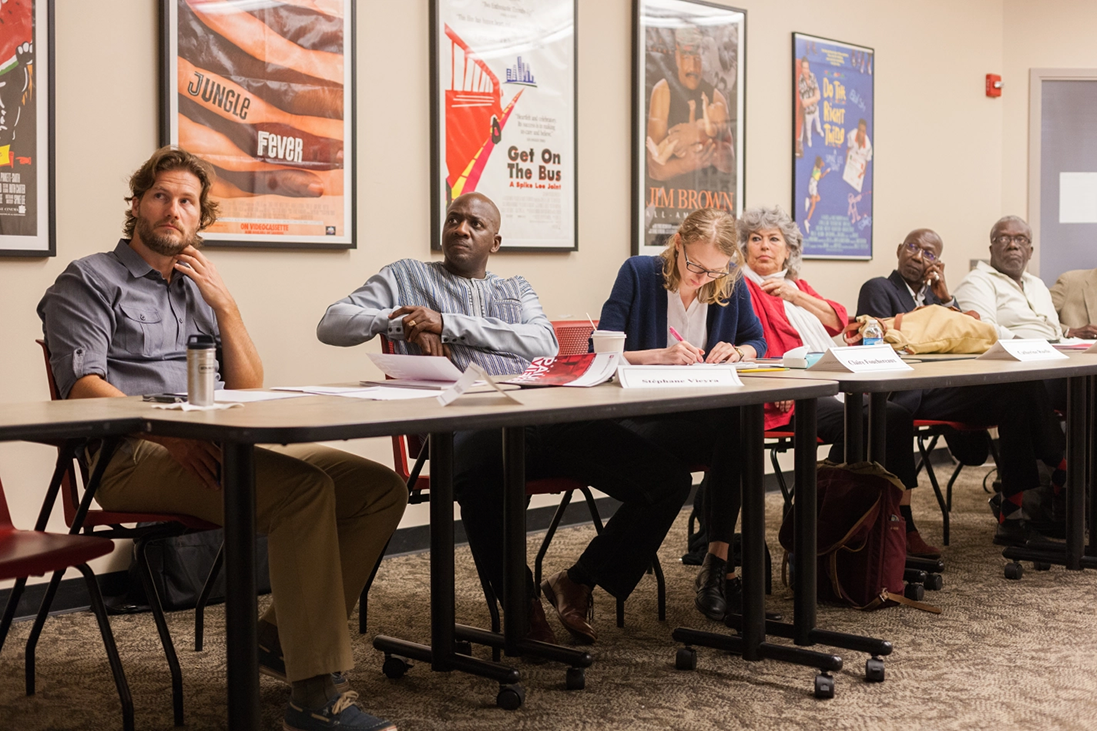Alison Calhoun saw her first doctoral advisee, Jake Ladyga (Ph.D., 2020), persevere during the challenges of the pandemic in order to brilliantly defend his dissertation remotely. She has also been selected to join the IU Cultural Studies Program as an affiliate faculty member.
In January, Elizabeth Hebbard, along with collaborators at IUB, Saint Mary’s College (Notre Dame, IN), and Loyola University Chicago, received a Digitizing Hidden Collections grant from the Council on Library and Information Resources (CLIR). Hebbard serves as Principal Investigator on “Peripheral Manuscripts: Digitizing Medieval Manuscripts in the Midwest,” a three-year project hosted at IUB that will photograph and catalogue nearly 500 medieval manuscripts in twenty-two collections throughout the Midwest. Most of these materials have not been previously described. All project images and descriptions will be made freely available to researchers through a digital repository created by IU Libraries.
At the end of February, Elizabeth Hebbard and Akash Kumar organized the symposium “Lyric Landscapes,” which featured scholars here from IU and around the country, including our department’s first Ph.D., recipient in Italian, Christopher Kleinhenz (Ph.D., 1969, Professor Emeritus, University of Wisconsin). The aim of the one-day event was to consider medieval verse in a variety of languages (Italian, Occitan, Persian, Hebrew, and more) through the lens of landscape, politics, and identity.
Eileen Julien reports that a highlight of the 2019-20 year was her fall seminar, Modern African Letters: Archives for Literary Interpretation. A multinational group of eight students explored the work of five African authors whose archives are housed at the Lilly Library: Athol Fugard and Nadine Gordimer (both of South Africa), Ngugi wa Thiongo (Kenya), Sembène Ousmane and Boubacar Boris Diop (both of Sénégal). “The seminar participants brought curiosity and incisive perspectives to our discussions and their engagements with one another, they scoured the archives of their chosen author(s), put on a superb pop-up exhibit, wrote original papers based on their research, and engaged with Louisiana poet laureate, Brenda Marie Osbey, who makes use of archives in her poetry, and Professor Sandra Zagarell of Oberlin College, whose research is on the archives of another Creole New Orleanian, Alice Dunbar Nelson. Kudos to this wonderful class!”
Eric MacPhail was on fellowship at the Meeter Center of Calvin University in Grand Rapids, Michigan during the month of July 2019. In January 2020, he published his new book Religious Tolerance from Renaissance to Enlightenment: Atheist’s Progress with Routledge.
Oana Panaïté edited a special dossier in the journal Nouvelles Études Francophones dedicated to historical writing in Francophone literature, co-edited an issue of the Revue critique de fixxion française contemporaine on what is means to write “French” fiction today, and contributed the chapter “Archives” in a volume that offers a critical and timely Postcolonial complement to Pierre Nora’s Lieux de mémoire.
Through active collaboration in the MLA Working Group “Italian Americans on the Page,” Colleen Ryan has authored a forthcoming chapter on mother-daughter relationships in plays by Italian American women writers. “Equally stimulating,” she writes, “was my experience of working with the vibrant, curious group of students in M311, Women in the Mafia and Antimafia in Italian American Cinema” in Spring 2020.
Having completed his term as department chair in December 2019, Massimo Scalabrini is enjoying a year-long leave, during which he is writing a monograph on conflict resolution in the Italian Renaissance. He presented parts of his book project at a conference on the Comic Renaissance in Italy sponsored by I Tatti | The Harvard University Center for Italian Renaissance Studies and hosted by the University of Alabama on February 28-29, 2020.
Elected president of the Society for Textual Scholarship in 2019, Professor Emeritus Wayne Storey delivered his presidential address, “Borghini’s Dilemma: Print Thinking and the Digital,” which was then published in Textual Cultures 13.1 (2020). At the end of 2019, his “Postfazione” for the volume Teoria e forme del testo digitale (Roma: Carocci), and his essay, co-authored with Isabella Magni, “Reading the Comedy in Manuscripts: Material Philology in Dante Studies” (for Teaching Dante’s “Divine Comedy” [New York: MLA]) were published. He is currently guest editing an issue of The Romanic Review (for 2021), writing an essay on Michele Barbi’s editorial principles for Studi Danteschi, and continuing his work on the Petrarchive.org Project.
In the past year, Paul Verlaine: A Bilingual Selection of His Verse was published (Penn State University Press, 2019), edited by Nicolas Valazza and translated by Professor Emeritus Samuel N. Rosenberg (see “In memoriam” in this newsletter). The two also did a bilingual reading of Verlaine’s poetry at the IU Eskenazi Museum of Art in December. In addition, Valazza co-edited a special issue of Nottingham French Studies: “Aesthetic Contaminations in Baudelaire” (July 2019) and gave a talk on Victor Hugo’s novel Les Misérables before the musical adaptation was performed at the IU Auditorium this past February.

 The College of Arts
The College of Arts